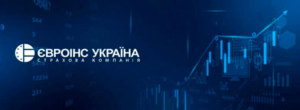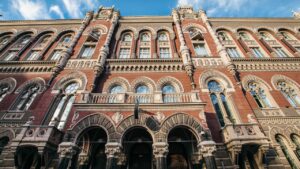
Ukraine will be able to avoid recession and even accelerate economic development after the end of active hostilities, the first deputy head of the NBU, Serhiy Mykolaychuk, has said.
In an interview with Interfax-Ukraine, he emphasized that the international experience of post-war crises is not fully applicable to Ukraine.
“We expect that defense spending will remain significant, while European integration plans and capital inflows will support the economy. In addition, the reintegration of veterans into peaceful life will be faster than it was in other countries, thanks to modern technologies and features of society,” Mykolaychuk said.

The use of exchange rate policy to address structural imbalances when international reserves are sufficient is a wrong decision, according to First Deputy Governor of the National Bank of Ukraine Sergiy Nikolaychuk.
In an interview with Interfax-Ukraine, he explained that the main factor behind the downgrade of GDP growth forecasts and revision of inflation in 2024 was increased security risks and the impact of weather conditions on crop yields.
“We analyze in detail the dynamics of missile strikes, drone attacks, and the duration of air raids. Unfortunately, this year the situation is much worse than last year. This has a direct impact on business activity and the economy’s potential,” Nikolaychuk said.
According to him, the foreign trade deficit is an “objective reality” caused by the war, increased imports for defense and energy needs, and reduced export opportunities.
“It would be wrong to solve these structural problems through exchange rate policy when we have a sufficient level of international reserves. We see other ways – more active state policy through duties, taxes or non-customs barriers to non-critical imports,” he emphasized.
The official emphasized that the National Bank continues gradual currency liberalization and has provided businesses with tools to hedge currency risks.

As of the end of August, 5.8 thousand notaries work in Ukraine, according to the Unified Register of Notaries of the Ministry of Justice of Ukraine. Since the beginning of the full-scale war, the number of notaries has decreased by 11%. A quarter of all notaries in the country work in Kyiv. 82% of these professionals are women.
5,845 notaries work in Ukraine. Since the beginning of the full-scale war, the number of notaries has decreased by an average of 200 professionals per year. In general, compared to 2021, there are now 11% fewer such specialists.
It is worth noting that the Register of Notaries is dynamic, as new lawyers are constantly added to it and specialists who are no longer authorized to practice notary work are removed. Accordingly, it is possible to compare the number of specialists only as of a specific date.
Most notaries are registered in Kyiv – 1,292 or 22%. Also, specialists choose to work in Dnipropetrovska oblast (451 (8)%), Lvivska oblast (446 or 8%), and Odeska oblast (420 or 7%).
Since the start of the full-scale notary campaign, the number of notaries has increased in relatively safe regions of the country: +5% in Cherkasy and Kyiv regions, +2% in Rivne and Vinnytsia regions. The only region where the number of notaries has not changed is Ternopil region: 132 specialists work there, as it was before the full-scale lockdown.
Instead, in the regions close to the frontline, the number of specialists has decreased: 20 times in Luhansk region, 4 times in Kherson and Donetsk regions, 1.8 times in Zaporizhzhia, and 1.3 times in Kharkiv region.
The majority of Ukrainian notaries are engaged in private practice – 88% or 5,139 of them. Another 12%, or 687 professionals nationwide, work in state notary offices and only 0.3% work in state notary archives.
The vast majority of Ukrainian notaries are women: 82% or 4,804 professionals. It should be noted that, unlike in many other areas, the full-scale war did not have much of an impact on the gender advantage in the notary profession: in 2021, there were 81% of women.
https://opendatabot.ua/analytics/notary-2025

The Supervisory Board of IC “Euroins Ukraine” on September 1, 2025 decided to terminate the activities of fifteen separate structural subdivisions, which have not been operating for a long time, the company reported in the information disclosure system of the National Commission on Securities and Stock Market (NCSSM).
In particular, we are talking about the sales center in Krasnoye settlement of Lviv regional directorate, a branch in Kharkiv, sales center in Kamenske of Dnipro regional directorate, sales centers № 4 and № 7 of Zaporizhzhya directorate, sales center in Skadovsk of Kherson regional directorate, a branch in Yuzhnoukrainsk of Mykolayiv region, Kherson regional directorate, sales center in Valki of Kharkiv regional directorate, sales center in Uman of Cherkassy regional directorate.
IC “Euroins Ukraine” is a universal non-life insurer, operating in the Ukrainian market since 1992. The company has 75 representative offices all over the country, has a license for insurance in 16 classes. It actively works in the segments of auto insurance, medical insurance, property, liability and cargo insurance for private and corporate clients.
IC “Euroins Ukraine” is a member of the Motor (Transport) Insurance Bureau of Ukraine, League of Insurance Organizations of Ukraine (LIOU) and EBA (European Business Association).

According to the investment platform Inventure.com.ua, an interesting investment opportunity has entered the market: a mountain recreation complex near the popular tourist centers Slavsko and GORA in Lviv region is for sale for $980,000.
The complex was built in 2023 and includes:
According to Inventure estimates, the gross income of the facility is $166,000 per year, with operating costs at 30-35%.

Serhiy Mykolaychuk said in an interview with Interfax-Ukraine that the NBU’s monetary policy remains moderately tight and effective. According to him, despite business criticism, the interest rate transmission is effective – stimulating hryvnia deposits and strengthening lending in the national currency.
He added that the interest rate of 15.5% is balanced and contributes to curbing inflation, generating yields on ISI and OVDP and preserving the stability of the foreign exchange market.